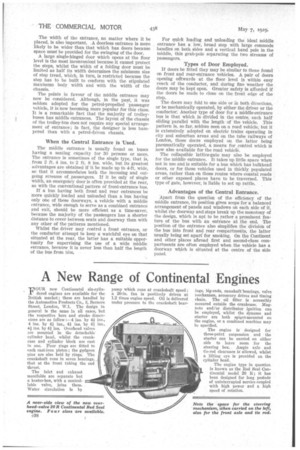A New Range of Continental Engines
Page 70

If you've noticed an error in this article please click here to report it so we can fix it.
FOUR new Continental six-cylin.12 dered engines are available for the British market ; these are handled by the Automotive Products Co., 3, Berners Street, London, W.1. The design in general is the same in all eases, but the respective bore and stroke dimenstone are as follow :-4 ins. by 41 ins-, 4 ins. by 41 ins., 4+ ins. by 41 ins., 41 ins. by 4i. ins. Overhead valves are mounted in the detachable cylinder head, whilst the crankease and cylinder block are cast in one. Four rings are fitted to each cast-iron piston ; the gudgeon Pins are also held by rings. The crankshaft runs in seven bearings, that at the front taking the end thrust.
The inlet and exhaust manifolds are separate but a heater-box, with a controllable valve, joins them. Water circulation is by pump which runs at crankshaft speed ; a 20-in. fan is positively driven at 1.2 times engine speed. Oil is delivered under pressure to the crankshaft bear
ings, big-ends, camshaft 'bearings, valve mechanism, accessory drives and timing chain. The oil filter is accessibly mounted outside the crankcase. Magneto and/or distributor ignition can be employed, whilst the dynamo and starter are both spigot-mounted on the engine, or a combined machine may be specified.
The engine is designed for three-point suspension and the starter can be carried on either side to leave room for the steering box.. Ample axle and tie-rod clearance is allowed, whilst a lifting eye is provided on the cylinder head.
The engine type in question is known as the Red Seal Continental model 20 It; it has been designed for long periods of uninterrupted service coupled with high power and a high speed of rotation.






























































































































